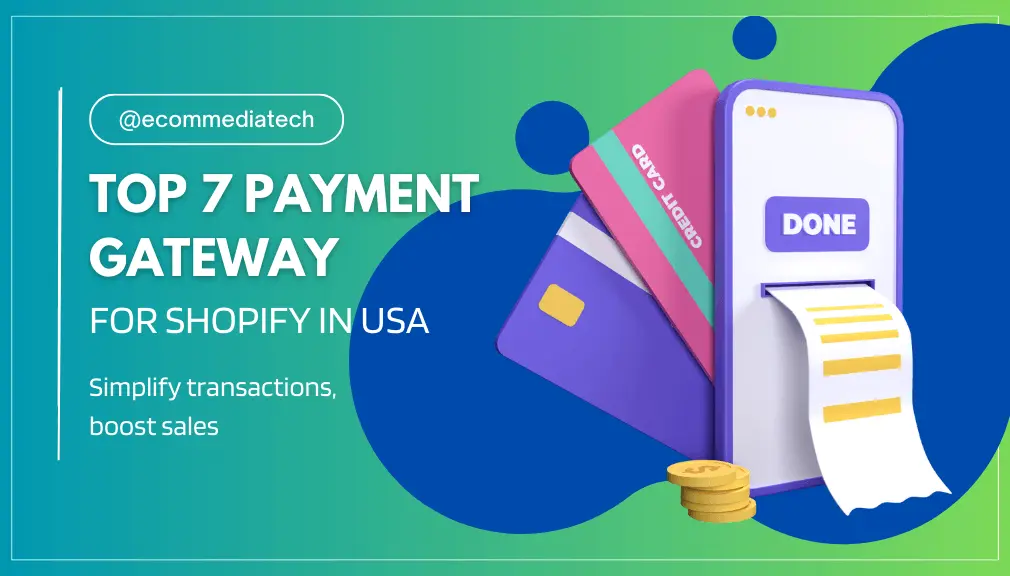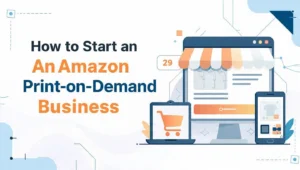Establishing a successful online store on Shopify extends far beyond just offering products. It requires a seamless and secure payment process to boot. Choosing the most appropriate payment gateway is so important for your store that typical questions concern whether it will affect your transaction fees, trust among customers who come into your market. You need to put energy into this matter as well.
With the fast-paced development of e-commerce now, having a smooth and secure payment process is the lifeline of both customer satisfaction and business prosperity. Shopify, one of those top-notch e-commerce platforms that understands this very well, has several different options for payment gateways in order to smooth those transaction processes up a bit and save you time.
This post will explore what a payment gateway is, why it is essential for your Shopify store, and how to select the right one.
What is a Payment Gateway?
We call the service that processes and confirms payments for an online merchant a payment gateway. It is essentially an intermediary between the customer’s bank and the merchant’s bank, and is responsible for ensuring that sensitive information like credit cards gets handed through its servers securely onto both ends all right. Prevent mishandling, the gateway encodes that information. No potential intruder can decode the encrypted data, so they won’t be able to use a stolen credit card number either!
Why is a Payment Gateway Essential for Your Shopify Store?
- Security: The gateways themselves offer a range of high-level security features, including cryptographic means by which we provide fraud detection, protection for both merchants and their customers.
- Efficiency: They speed up the payment process, cutting in half the number of computational hours or days involved. Credit is efficiently given because money can be subsequently charged from an individual customer who has received a good or service, rather than asking that all merchants make advance payments before any work on their behalf begins.
- Trust: Generally, A good payment gateway can make customers feel confident about undertaking an order, whereas a bad one will only lead them to abandon it in the end. In this way, trustworthiness has become an increasingly important factor for online merchants and has marketing implications.
- Global Reach: Many payment gateways support multiple currencies and payment methods, more widespread than any single means could be, broadening your potential consumer base.
How to Choose the Right Payment Gateway for Your Shopify Store
When selecting a payment gateway, consider the following factors:
- Fees: Compare transaction fees, setup fees, and monthly fees. Some gateways charge higher fees, and this can significantly cut into your profits.
- Payment Methods: Market research assists you in determining the payment methods to which your target audience is most attracted. Look at what your competitors are doing. Begin by offering these as well until you have some very appealing feedback from forum members or customers.
- Integration: Look for gateways that integrate seamlessly with Shopify, providing a good user experience.
- Security: Prioritize gateways with strong security features to protect your business and its customers.
- Customer Support: Lacking reliable customer support, issues that arise during the payment process may go unresolved for days or weeks, as is common in some systems today that use phone menus and overseas call centres to handle inquiries.
- Global Reach: If you plan to sell internationally, choose a gateway that supports multiple currencies and international payments.
Setting Up a Payment Gateway on Shopify
Setting up a payment gateway on Shopify is straightforward:
- Log in to Your Shopify Admin: Navigate to the ‘Settings’ section.
- Select ‘Payments’: Here, you’ll see the available payment gateway options.
- Choose Your Preferred Gateway: Click on the gateway you want to use and follow the setup instructions.
- Configure the Gateway: Enter the necessary credentials and settings provided by the payment gateway.
- Test the Gateway: Before going live, make a test transaction to ensure everything is working correctly.
Best Payment Gateway for Shopify in the USA
1. Shopify Payments

Shopify Payments is an integrated payment solution launched by Shopify to present merchants and buyers with a smooth and user-friendly checkout process. In addition, Shopify Payments means store owners can carry out the entire business, including payment handling, directly from inside the Shopify system, avoiding any need to use third-party processors.
Features:
- Seamless Integration: As Shopify’s native payment gateway, it offers the smoothest integration.
- No Transaction Fees: Shopify Payments eliminates the additional transaction fees that third-party gateways charge.
- Multiple Currencies: Supports multiple currencies, allowing international sales.
- Chargeback Management: Includes tools for managing and disputing chargebacks directly within Shopify.
Pros:
- Simplified setup with Shopify stores.
- Lower fees due to no transaction charges.
- Enhanced checkout experience for customers.
Cons:
- Limited to certain countries.
- Requires a Shopify plan, which can be a downside for small businesses on a tight budget.
2. PayPal

PayPal is a well-known payment gateway. Originally an indie service for eBay customers handling both national and international payments, today it’s established and trusted globally. It allows businesses of all sizes, as well as people, to send or receive money safely over the internet. If you’re an owner of a Shopify store, then adding PayPal as a payment option also immediately provides the shopping public with something they are comfortable and accustomed to using, irrespective of its reliability, still or again.
Features:
- Global Recognition: Trusted by millions of users worldwide.
- Buyer Protection: Offers comprehensive protection for buyers, which can increase trust.
- Flexible Payment Options: Supports various payment methods, including credit cards and bank transfers.
Pros:
- Widely accepted and trusted by customers.
- Easy setup and integration with Shopify.
- Supports international transactions.
Cons:
- Higher transaction fees compared to some other gateways.
- Funds can sometimes be held, causing delays in accessing money.
3. Stripe

Stripe as a payment processor, enjoys a reputation that waves of wild rumblings up and down the land have been incapable of shaking. It can even be integrated into Shopify stores.
Features:
- Developer-Friendly: Highly customizable for developers looking to create a tailored payment experience.
- Recurring Billing: Excellent for subscription-based businesses.
- Real-Time Reporting: Provides detailed insights and reporting features.
Pros:
- Supports a wide range of payment methods.
- Competitive transaction fees.
- Strong fraud protection features.
Cons:
- Requires technical knowledge for advanced customization.
- Customer support can be slow to respond.
4. Square

Boasting user-friendly merchant services, comprehensive features, and reasonable prices, Square’s payment system has a high degree of recognition. As well as holding square readers in their hands, they can beam money via QR codes and take care of all these kinds of operations with only the touch of their fingers!
However, as of my last update, a direct interface for online payments between Square and Shopify is not available. Instead, merchants typically utilize other payment gateways for online transactions, such as Shopify Payments, Stripe, PayPal, etc.
Features:
- Omni-Channel Payments: Perfect for businesses that sell both online and offline.
- Free Point of Sale (POS) System: Comes with a free POS system for physical stores.
- Instant Deposits: Offers instant deposits for an additional fee.
Pros:
- Unified system for both online and offline sales.
- Easy-to-use interface.
- No monthly fees.
Cons:
- Limited availability in certain countries.
- Higher fees for instant deposits.
5. Authorize.Net

This is especially true because of its great stability, full range of features, and good after-sales service. By integrating Authorize.Net with your Shopify store, customers can enjoy an easy, secure, and pleasant checkout experience.
Features:
- Advanced Security: Uses advanced fraud detection tools.
- Recurring Billing: Great for subscription models.
- Comprehensive Support: Offers extensive customer support.
Pros:
- Strong security features.
- Supports a variety of payment options.
- Good for high-volume merchants.
Cons:
- It can be complex to set up.
- Monthly gateway fee plus transaction fees.
6. 2Checkout (now Verifone)

More than 85 global destinations for processing transactions online, but with 2Checkout, merchants can escape costly fees as a consequence. It incorporates global payment processing, recurring billing options, and support for multiple currencies.
Merchants who integrate their Shopify store with 2Checkout can offer their customers the ease of checkout they have come to expect offline. This will raise sales volume and overall revenues.
Features:
- Global Reach: Supports payments in multiple currencies and languages.
- Flexible Integration: Easily integrates with Shopify and other platforms.
- Advanced Fraud Protection: Uses AI-driven fraud prevention tools.
Pros:
- Excellent for international sales.
- Supports a wide range of payment methods.
- No monthly fees, only per-transaction fees.
Cons:
- Higher transaction fees compared to some other gateways.
- Customer service can be slow.
7. Amazon Pay

With Amazon Pay, your customers can use the balance from their account to purchase in any Shopify store, including digital goods and services from participating merchants, indeed!
Features:
- Trusted Brand: Leverages Amazon’s global trust and recognition.
- Easy Checkout: Streamlined checkout process using Amazon credentials.
- Mobile-Friendly: Optimized for mobile transactions.
Pros:
- Increased customer trust and potential for higher conversion rates.
- Simple and quick checkout process.
- No setup or monthly fees.
Cons:
- Limited to customers with Amazon accounts.
- Higher transaction fees compared to some other options.
Key Takeaways
- Security First: Payment gateways ensure safe transactions, building customer trust.
- Seamless Integration: Options like Shopify Payments and PhonePe PG simplify setup.
- Multiple Payment Options: Support for cards, UPI, and wallets reduces cart abandonment.
- Cost-Effective: No integration fees with Shopify; choose gateways with minimal transaction costs.
- Global Reach: Gateways like Stripe support 135+ currencies for international sales.
Conclusion
Each payment gateway has its own unique pleasing points and possible costs. However, through accurately understanding your own customers’ shopping habits, along with which new system might hold better results in future performance, an apposition and shopping experience can be given that goes over smoothly regardless of the eccentricities any foreign gateway may have imported to your Shopify store.
FAQs
What is a payment gateway for Shopify?
So when you talk about a payment gateway, you’re really talking about how it finds an agreeable bridge between your Shopify store and your customers’ banks so they can make safe, secure, and effective payment transfers.
Why is Shopify Payments a good choice?
Shopify Payments offers integrated payments, no fees, and support for all major payment methods. It is as easy as switching on Shopify Payments; if only setting up a Shopify store were always that simple.
Can PayPal be used with Shopify?
Yes, PayPal does have seamless integration with Shopify. PayPal is globally recognized for payments, and there are no sign-up fees; and it has capabilities for subscription payments.
What makes PhonePe PG ideal for India?
PhonePe PG offers no-code integration, offers over 150 payment options, no-checkout, and genuinely fast checkouts have good success rates for Indian based Shopify stores.
How do payment gateways reduce cart abandonment?
Gateway providers that offer multiple payment options feature multiple checkout buttons, improve user experience, build trust, and reduce cart abandonment.
Are there fees for integrating payment gateways with Shopify?
Shopify does not charge fees for a third-party payment gateway integration. Only the provider would have a transactional fee.
What security features do payment gateways offer?
Gateways like Stripe offer more advanced fraud detection (Radar), while others like Square monitor transactions to ensure they process securely.
















